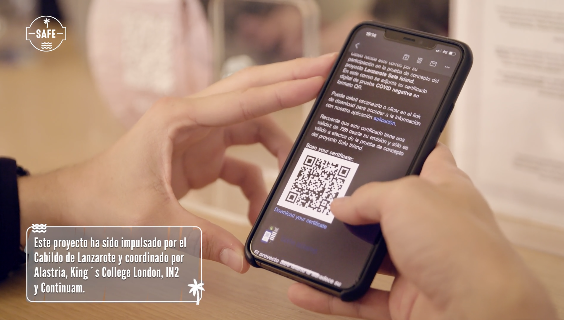Sector: Health
Aplicación: Certification
Empresa: Cabildo de Lanzarote, King’s College London, Alastria, IN2 and Continuam
Until 2019, tourism made up 12.5% of the Spanish GDP, which shows the need to reactivate this national economic engine. Tourism accounts for 35% of the Canary Islands’ wealth, and almost 20% of tourists coming to the archipelago choose Lanzarote as their destination island. But travelling still entails a risk, which is why there is a demand for measures to ensure the safety of travellers and residents. For this reason, the Island Council of Lanzarote, through “Turismo Lanzarote”, has launched a project that combines scientific research and technology to meet the needs of the island’s economic activity, while preventing, monitoring and controlling the probability of contagion, by implementing safe, simple and effective protocols for the control and monitoring of COVID-19.
The project includes regular saliva testing (PCRq) of both tourists and staff involved in tourist accommodation and activities. This non-invasive saliva PCRq provides results within a few hours and is as reliable as nasopharyngeal PCR. The tests are analysed in laboratories accredited by health authorities and are uploaded to a blockchain-based application that allows tourists to receive a certificate with the results on their smartphones via a QR code, or to bring it up on a website. It also includes credentials based on statements of compliance with the COVID-19 prevention protocols issued by tourism establishments and service providers. The pilot test, carried out from 14 to 17 May 2021, involved 60 tourists, 260 employees and professionals from the sector, and 10 tourism establishments and suppliers (hotel, food and beverage, leisure activities and transport).
Alastria, King’s College London, IN2 and Continuam all contributed to the project. Lanzarote’s safe tourism experience model can be applied to all activities in the sector, such as accommodation, shops, restaurants, leisure activities and car hire services. The solution was presented by the Island Council of Lanzarote in the technology area of the International Tourism Fair, FITUR-TECHY 2021.
Why blockchain?
Blockchain technology makes it possible to trace and verify the entire PCRq process, while respecting users’ privacy. As it is based on blockchain technology, the application is interoperable with the European digital certificate and complies with European Commission standards.
In addition, the technological tool allows tourists to get accurate and verified information on the COVID-19 protocols in place in tourist establishments and services quickly and easily by scanning a QR code with their mobile phone. The statements of compliance made by these establishments are logged and traced on the Alastria members’ blockchain network (T Network) and allow information on COVID-19 prevention measures to be verified by both tourists and third parties (governments, compliance companies, etc.) in an objective and transparent manner.
How it works
- Tourists take the saliva test (PCRq) when checking in at the hotel. This test is carried out every three days during their stay at the destination.
- The employees of tourism accommodations, establishments and service providers take the saliva test (PCRq) every three days.
- The accredited laboratory uploads the PCRq results to the blockchain-based platform, with guaranteed privacy for the users.
- Users (tourists, staff and suppliers) receive an email message to download their diagnostic test credential via a QR code.
- The tourism accommodations, establishments and service providers can check the validity of the PCRq credential (QR code) in the verification application.
- The tourism accommodations, establishments and service providers make statements of compliance with the COVID-19 prevention protocols, from which blockchain-based credentials are issued.
Tourists can verify the credentials of establishments using the QR code.
